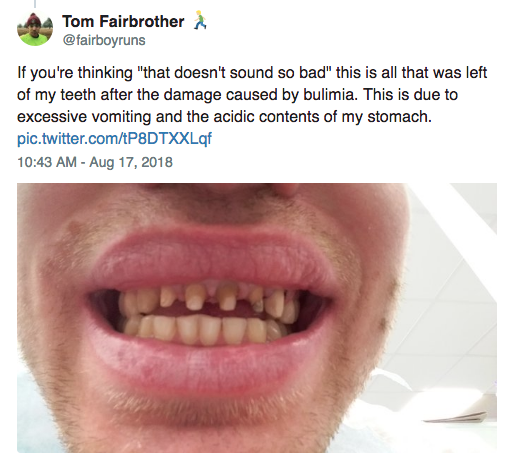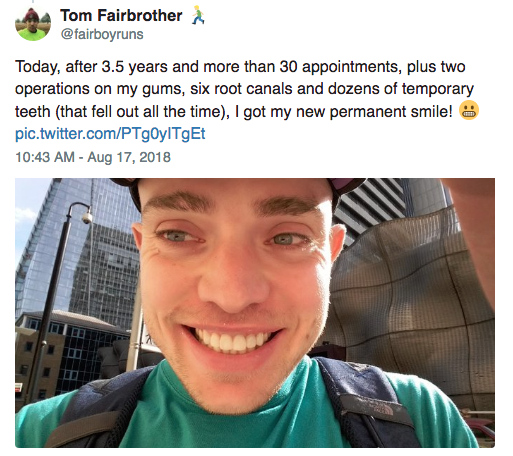
I was tagged in a thread this week on Twitter that caused me to have somewhat of an Ebenezer Scrooge experience. Tom Fairbrother, a marathon runner (who admittedly I hadn’t heard of before) who writes about his own struggles with bulimia, created a series of tweets detailing the damage his eating disorder caused his teeth and how the intervention of his dentist was what was able to spark his recovery.
Tom’s story highlighted to me what I already suspected. Had one of my dentists during my biannual dental check ups over the years pulled me to the side and had a delicate word with me about the harm I could be causing myself by making myself sick routinely multiple times a day, I might’ve been embarrassed into seeking the professional support I needed to recover…quicker.



I was in and out of the dentist more than most when I was younger, as before my teens I broke my two front teeth after my little brother tripped me and I smacked my face on concrete – not that I’m holding a grudge (Jamie you prick). Up until the year I turned 18 and received my crowns, I made do with catching the triangle-shaped fillings in my palms as they would fall out after I’d do something as dramatic as eat a Malteser, and I’d have to go get them glued back in place. During such escapades to the dentist’s chair, I did used to think it was strange that no dentist ever commented on the damage I might’ve been doing to my teeth through bulimia – Googling told me teeth didn’t enjoy being coated in bile – so I continued vomitting at every opportunity, believing I’d “gotten away” with ruining my teeth until my next appointment. I grew up wondering that maybe bulimia doesn’t actually erode your teeth, and that that was just another urban legend.
I found out recently it is not.
I started working at a dental laboratory, Advanced Dental Lab, a few months ago, eventually feeling comfortable enough to tell them about my own dental history. I semi-gloated about the lucky escape I’d had avoiding harming my teeth throughout years of bulimia, much to the horror of a room of dental professionals. They told me that, no, actually, a dentist would be able to tell from looking in your mouth straight away if I had an eating disorder, which left me feeling confused and a little angry.
Why had none of the dentists whose chair I had sat in said anything to me?
This snippet from a BBC Woman’s Hour show I featured on to discuss the topic might explain why:
The Advanced Dental team mused that this might be that dentists feel it is “not their place” to comment on such “personal” matters, but agreed that more should be done to change this. Just look back at Tom’s story, fgs. With the lab’s help, we’ve therefore launched a campaign to get more people within dentistry talking about mental health. They have also very sweetly arranged for me to have my own teeth fixed – a process which I will be filming and documenting on their social media channels. I had my first appointment with the dentist who will be working his magic a week ago, and he informed me after a look in my mouth that the yellowness of my teeth in comparison to my white crowns were a clear sign that bulimia had caused some damage. A fact that I’d tried to deny for so many years.
Do you feel poor #mentalhealth is damaging your teeth?
— Advanced Dental Laboratories (@AdvancedDenLab) August 16, 2018
But discolouration isn’t the only negative thing that eating disorders can do to our teeth. Frequent vomiting may cause your salivary glands to swell and the tissues of your mouth and tongue to become dry, red and sore and people with bulimia may have chronic sore throat and small haemorrhages under the skin of the palate. Frequent vomiting can also erode your tooth enamel, especially on the tongue side of the upper front teeth. This sharply increases the risk for decay in these areas and can make these teeth sensitive to temperature (my teeth are enormously sensitive). Severe erosion can lead to changes in your bite, or the way your upper and lower teeth come together. Your back teeth can be reduced in size and some teeth can even be lost eventually. Tooth erosion can take about three years to become obvious. With anorexia, osteoporosis can develop, weakening the bones in the jaw that support the teeth, leading to tooth loss.
Although I would never be interested in blaming any dentists for the length of my eating disorder, I can’t help but question how different my life could have been had one of them picked up on my mental illness. I was a vulnerable 16 year old with dwindling friends, parents I felt I couldn’t talk to and I was too scared to tell my doctor about what was going on. I believe now that had a medical professional told me plainly that I should get some help, I could have a story more like Tom’s and less like mine…but the reality is that I am only seeking dental treatment ,specifically with my eating disorder in mind, nine years later, and that could be nine years too late for some other young person walking in my tormented footsteps. That is why it’s important to campaign for a future where mental health is discussed in dentistry – it could save lives.

*Declared interests: The author is affiliated with Advanced Dental Laboratory



Thanks Fiona, it is tasty xgluten sensitivity